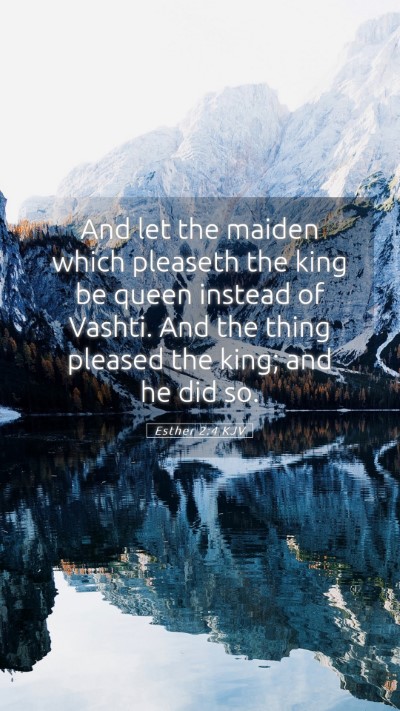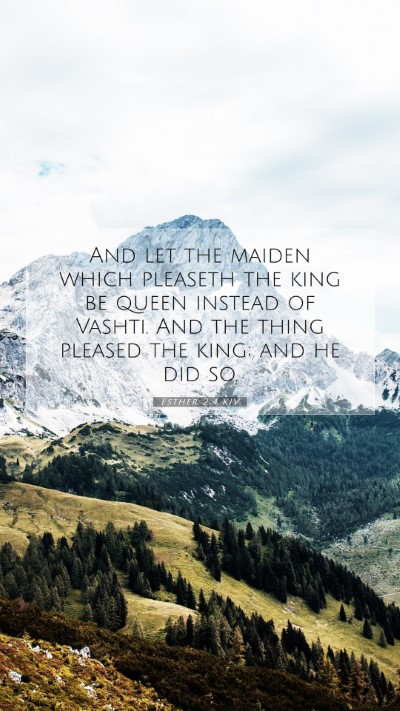Old Testament
Genesis Exodus Leviticus Numbers Deuteronomy Joshua Judges Ruth 1 Samuel 2 Samuel 1 Kings 2 Kings 1 Chronicles 2 Chronicles Ezra Nehemiah Esther Job Psalms Proverbs Ecclesiastes Song of Solomon Isaiah Jeremiah Lamentations Ezekiel Daniel Hosea Joel Amos Obadiah Jonah Micah Nahum Habakkuk Zephaniah Haggai Zechariah MalachiEsther 2:4 Meaning
What is the meaning of Esther 2:4?
And let the maiden which pleaseth the king be queen instead of Vashti. And the thing pleased the king; and he did so.
Esther 2:4 Bible Verse Meaning
Understanding Esther 2:4
Esther 2:4 states: "And let the maiden which pleaseth the king be queen instead of Vashti." This verse conveys a significant moment in the narrative of Esther, illustrating divine providence and the unfolding of God's plan for His people.
Bible Verse Meanings
The meaning of this Bible verse can be unpacked through various commentary insights, focusing on the themes of divine selection, the role of women in the biblical narrative, and the implications of leadership changes.
Bible Verse Interpretations
Matthew Henry's commentary highlights that this verse depicts the king's need for a new queen after Vashti's refusal to appear, pointing to the tension between male authority and female agency. This scenario sets the stage for Esther's rise to prominence, showcasing God's orchestration in seemingly mundane events.
According to Albert Barnes, Esther 2:4 signifies the king's desire to replace Vashti with someone who fulfills his expectations and desires. Barnes emphasizes the cultural and social settings of the time, indicating how the selection process underscores the importance of beauty and favor in royal matters.
Adam Clarke's exposition brings a deeper understanding of the societal implications, noting that the search for a new queen not only reflects the arbitrary nature of royal decrees but also illustrates underlying themes of power and influence within the Persian court.
Insights from Biblical Exegesis
- Divine Providence: The circumstances leading to Esther becoming queen are viewed as part of a greater divine plan, suggesting that God places individuals in positions of influence for the protection and deliverance of His people.
- Role of Women: This verse opens the door to understanding women's roles in the biblical narrative as both secondary to male leadership yet also pivotal in God's plan, as demonstrated by Esther's eventual actions.
- Cultural Context: The context of royal decrees in ancient Persia sheds light on the societal values of beauty and favor, informing readers of the historical significance of such personal choices in governance.
Applying Bible Verses to Daily Life
Esther's story is not just about a queen; it serves as a reminder of God's sovereignty and ability to bring about change in critical times. Believers can draw parallels between Ester’s experiences and contemporary issues regarding leadership, courage, and the influence of individuals in their communities.
Cross References
- Esther 1:19: Discusses the decree of the king following Vashti's refusal.
- Esther 4:14: Highlights Esther's purpose and the significance of her position.
- Proverbs 21:1: Emphasizes how leaders are guided by the Lord, tying to Esther’s divinely orchestrated rise.
Conclusion
Esther 2:4 serves as a foundational verse in understanding the journey of Esther from an ordinary Jewish girl to the queen of Persia, emphasizing themes of God’s providence, the significance of courage, and the role of women in the Bible. The overall Bible study insights gained from this verse contribute to a greater understanding of sacred scripture and its applications to our lives.


